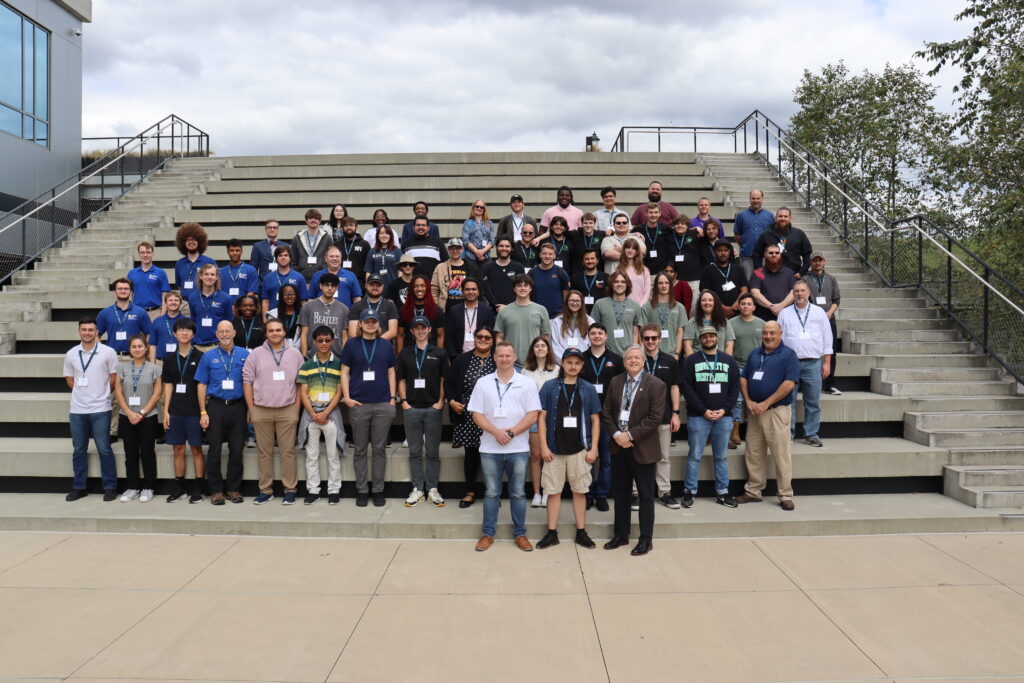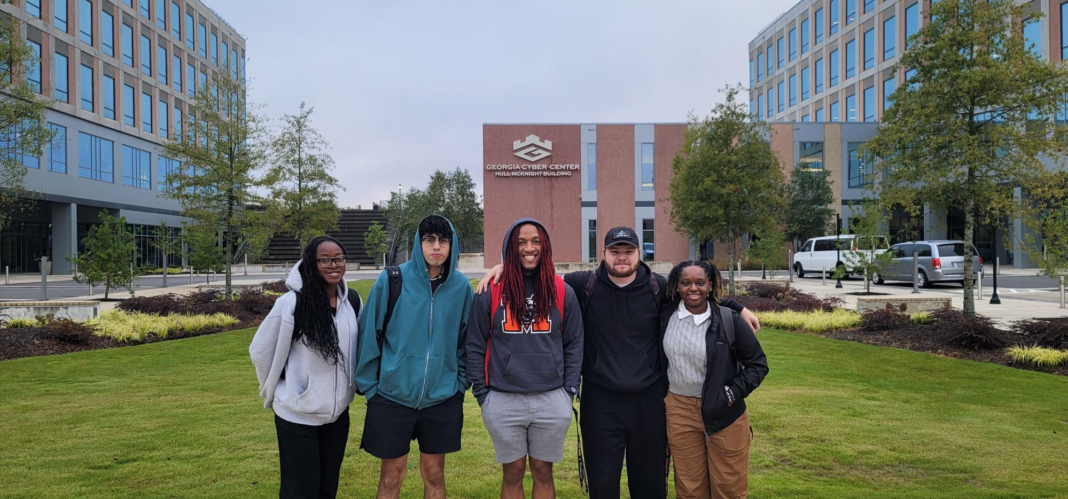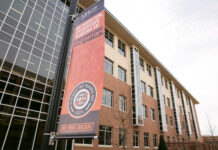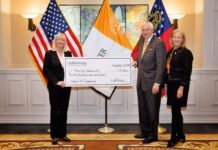A Mercer University club is starting to make a name for itself at competitions while giving students real-world experience in the field of cybersecurity.
The CyBears cybersecurity team was formally established in spring 2022 but has been around in a more unofficial capacity for several years. It was first coached by Computer Systems Manager Jesse Sowell and now is led by computer science faculty Dr. Johnathan Yerby and Dr. Adeel Malik.
Cybersecurity is a growing career field, and more colleges and universities are assembling teams to participate in national and international competitions, Dr. Yerby said. In these events, some held online and some in person, students’ use their computer and “hacking” skills to respond to simulated cybersecurity threats.
“Like sports, there’s offense and defense,” Dr. Yerby said of the competitions. “There’s offense, people that are attacking, and defense, people that are defending. They’re practicing to attack and defend.”
The majority of CyBears members are cybersecurity majors, but a few are studying information science and technology, computer science or other fields. They have a dedicated cybersecurity lab where they can meet, practice their skills and prepare for competitions.
The past two years, CyBears has participated in the online National Cyber League Competition and the Collegiate Penetration Testing Competition in Augusta.
The former draws in about 8,000 competitors from across the world. Participants practice and hone their skills in the competition’s online “gymnasium,” participate in a practice game, and see how many challenges they can solve during weeklong individual and team events. Mercer placed 96th among 8,580 students from 510 U.S. colleges and universities during the fall 2023 competition and 47th in the spring 2022 event, the team’s best performance to date, Dr. Yerby said.
For the Collegiate Penetration Testing Competition, teams spend the day performing a series of tests on their assigned company to see what information and systems they can access and then write a report of the vulnerabilities they find. CyBears was among 10 teams invited to the competition after an application process.
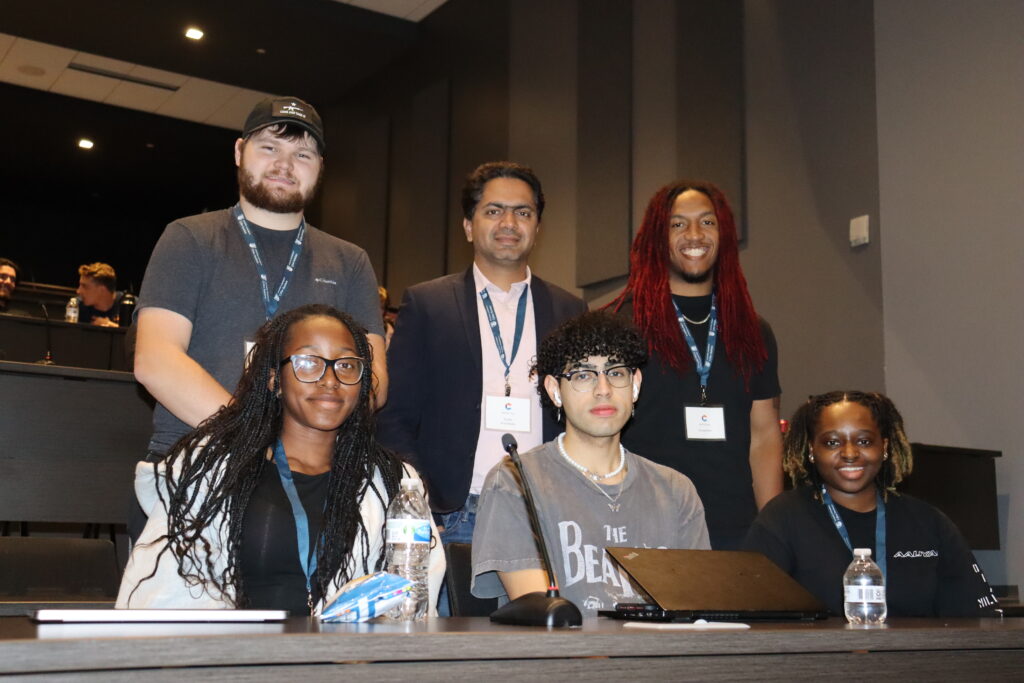
“They are doing well, especially to be team-wise as young as they are. They’re doing fantastic,” Dr. Yerby said. “They’re beating out much more well-established programs in the nation. I know they can do even more. They’re very smart people.”
In the past, Mercer students have also participated in the Southeast Collegiate Cyber Defense Competition, which the club hopes to get back into; Cybersecurity and Infrastructure Security Agency’s President’s Cup Competition; and an event hosted by the SANS Institute, through which a student won a scholarship.
“It gives the students the ability to test what they’re learning, to test their personal fortitude and to showcase where they stack up against the world,” Dr. Yerby said. “More and more employers are paying attention to these (competitions) in the cybersecurity world. We haven’t made it No. 1, but we’re in the conversation. Hopefully that’s helping students get jobs and some scholarships and prizes.”
Participating in these competitions allows students to apply what they’ve learned in class and discover new things that they can expand upon individually, said Dr. Malik, who joined Mercer’s faculty and began helping with CyBears in the fall. Students learn skill sets needed for jobs in cybersecurity, discover if it’s the right career field for them, and gain an experience that adds value to their resumes.
“When I teach them these cybersecurity aspects at school, it’s mostly theoretical,” Dr. Malik said. “When you start doing them in a scenario-based setting where this is my job, you understand the bigger picture of where this is going, what you are learning right now or what you should be learning. We’re giving them opportunities to shine.”
CyBears is open to anyone, even those who don’t have prior experience. With practice and guidance, students get past the initial knowledge gaps and experience breakthroughs that keep them coming back for more, Dr. Yerby said.
“I love seeing those students that something bites them and gives them that passion,” he said. “Our biggest challenge is building up that continuity and trying to get people involved earlier. They don’t have to come in being experts; they just have to come in wanting to try and to learn.”
As a junior last year, Patrick Burnette switched his major from biology to cybersecurity, joined CyBears and participated in two competitions. Now a senior, he already has a job lined up for after graduation in a two-year cybersecurity program at Equifax in Alpharetta. He said his experiences with CyBears helped him gain important professional skills.

“Everything you learn in class usually isn’t enough. You have to go outside of the classroom and do practical things to really hone your skills,” Burnette said. “I wanted to do that because in cybersecurity it’s important to think like an attacker, and in a lot of these competitions, you’re going in as an attacker. I recommend anyone who’s getting into cybersecurity to get in CyBears because it will help you in the long run to get a job and improve your skills.”
Matthew Coburn, a junior double-majoring in cybersecurity and information technology, got involved in CyBears last year. He has participated in two competitions so far and plans to compete in the National Cyber League Competition later this semester.
“You get a ton of hands-on, real-world application,” Coburn said. “A lot of this stuff isn’t necessarily taught in classes. You get to go out and do research on your own. Cybersecurity is an ever-expanding career, and you really need to love learning and continue that learning throughout your career. If you put your mind to it, you can do a lot with cybersecurity.”
In addition to competitions, CyBears focuses on community cyber awareness and education, which aligns with Dr. Malik’s research. He hopes that CyBears can go out into locations like schools, churches and senior centers in the future to give talks on internet safety.
“All of us are connecting to the internet in one way or another, whether we are home users or working at an office or school or in an industry setting. That means we are exposed to cyberthreats,” he said. “No matter what your discipline is, don’t think that cybersecurity or these technologies are not for me. Like it or not, you are a user of cyberspace, and you too can learn to stay safe on the internet.”
Dr. Yerby would like to see CyBears grow in members, so it can compete in larger competitions. Students may become “specialists” in certain types of competitions, so they can train younger competitors going forward. CyBears’ continued involvement in competitions will help spread the word about the club, as well as the University’s cybersecurity program, Dr. Malik said.
“This will open up internship opportunities for students, and people in the cyber world will know these students as cyber specialists,” Dr. Malik said.
Students interested in joining CyBears may contact Dr. Yerby at yerby_jm@mercer.edu or Dr. Malik at malik_aa@mercer.edu.
